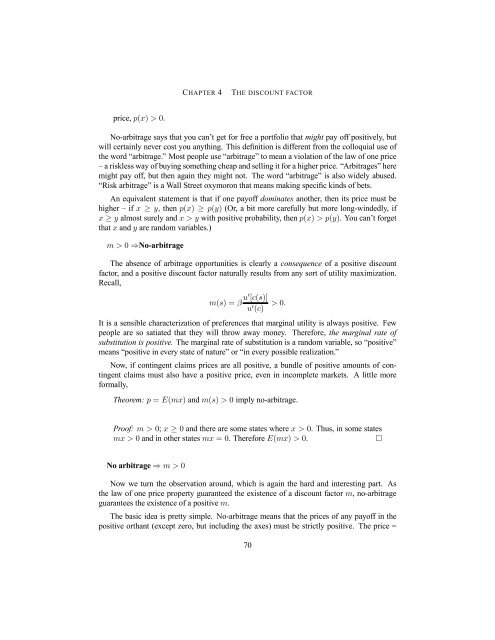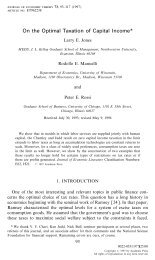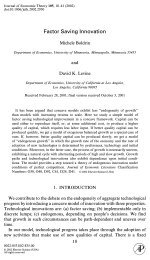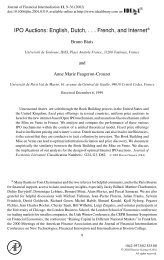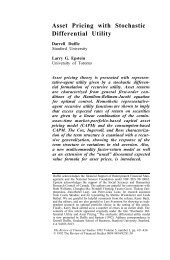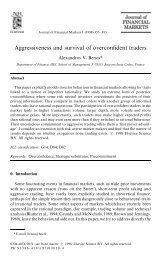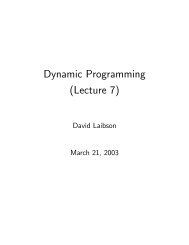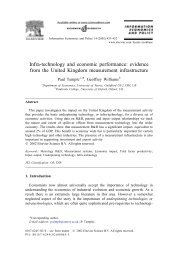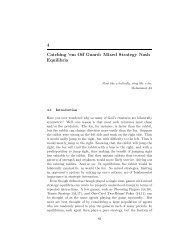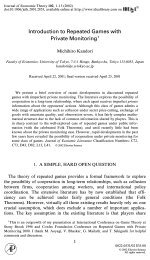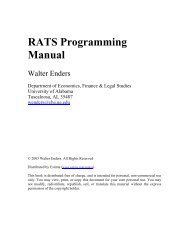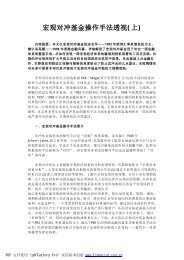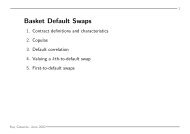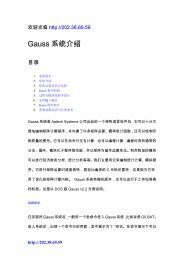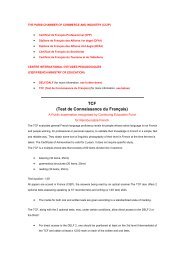Asset Pricing John H. Cochrane June 12, 2000
Asset Pricing John H. Cochrane June 12, 2000
Asset Pricing John H. Cochrane June 12, 2000
You also want an ePaper? Increase the reach of your titles
YUMPU automatically turns print PDFs into web optimized ePapers that Google loves.
price, p(x) > 0.<br />
CHAPTER 4 THE DISCOUNT FACTOR<br />
No-arbitrage says that you can’t get for free a portfolio that might pay off positively, but<br />
will certainly never cost you anything. This definition is different from the colloquial use of<br />
the word “arbitrage.” Most people use “arbitrage” to mean a violation of the law of one price<br />
– a riskless way of buying something cheap and selling it for a higher price. “Arbitrages” here<br />
might pay off, but then again they might not. The word “arbitrage” is also widely abused.<br />
“Risk arbitrage” is a Wall Street oxymoron that means making specific kinds of bets.<br />
An equivalent statement is that if one payoff dominates another, then its price must be<br />
higher – if x ≥ y, then p(x) ≥ p(y) (Or, a bit more carefully but more long-windedly, if<br />
x ≥ y almost surely and x>ywith positive probability, then p(x) >p(y). You can’t forget<br />
that x and y are random variables.)<br />
m>0 ⇒No-arbitrage<br />
The absence of arbitrage opportunities is clearly a consequence of a positive discount<br />
factor, and a positive discount factor naturally results from any sort of utility maximization.<br />
Recall,<br />
m(s) =β u0 [c(s)]<br />
u 0 (c)<br />
It is a sensible characterization of preferences that marginal utility is always positive. Few<br />
people are so satiated that they will throw away money. Therefore, the marginal rate of<br />
substitution is positive. The marginal rate of substitution is a random variable, so “positive”<br />
means “positive in every state of nature” or “in every possible realization.”<br />
Now, if contingent claims prices are all positive, a bundle of positive amounts of contingent<br />
claims must also have a positive price, even in incomplete markets. A little more<br />
formally,<br />
> 0.<br />
Theorem: p = E(mx) and m(s) > 0 imply no-arbitrage.<br />
Proof: m>0; x ≥ 0 and there are some states where x>0. Thus, in some states<br />
mx > 0 and in other states mx =0. Therefore E(mx) > 0. ¤<br />
No arbitrage ⇒ m>0<br />
Now we turn the observation around, which is again the hard and interesting part. As<br />
the law of one price property guaranteed the existence of a discount factor m, no-arbitrage<br />
guarantees the existence of a positive m.<br />
The basic idea is pretty simple. No-arbitrage means that the prices of any payoff in the<br />
positive orthant (except zero, but including the axes) must be strictly positive. The price =<br />
70


